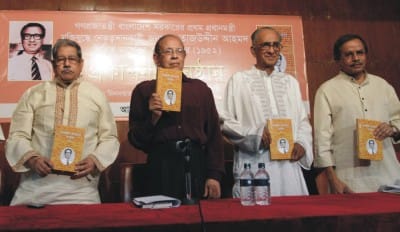Tajuddin spoke for war crimes trial

(From left) Prof Anisuzzaman, Prof Khan Sarwar Murshid, former chief adviser Justice Muhammad Habibur Rahman and Prof Syed Manzoorul Islam hold copies of the fourth part of Tajuddin's diary at a publication ceremony at Poet Sufia Kamal Auditorium at National Museum in the city yesterday.Photo: STAR
The country's first prime minister Tajuddin Ahmad had spoken for trial of war criminals at the time of the Liberation War, Finance Minister AMA Muhith said yesterday.
Reminiscing his days with the first premier of Bangladesh, Muhith said, "In August or September of 1971, he spoke for the trial of war criminals."
"So the war crime trial is not a new issue to us. We had plans to try them [war criminals] even the time when they were committing war crimes," said the finance minister while addressing the publication ceremony of the fourth part of Tajuddin's diary.
The diary was published marking the 85th birth anniversary of Tajuddin at Poet Sufia Kamal Auditorium at National Museum in the capital. Eminent academic Prof Khan Sarwar Murshid chaired the ceremony.
Distinguished citizens and intellectuals including former chief adviser Justice Muhammad Habibur Rahman, National Professor Anisuzzaman, Prof Abdullah Abu Sayeed, founder of Biswasahittya Kendra, Prof Syed Manzoorul Islam of Dhaka University, poet and writer Belal Chowdhury and Governor of Bangladesh Bank Atiur Rahman also spoke at the function.
Tajuddin's daughter Simeen Hussain Rimi made the inaugural speech thanking the people who helped her publish the book.
Habibur Rahman said Tajuddin was a successful organiser of the Liberation War.
Prof Murshid said, "Tajuddin was an extraordinary human being."
"The nation owes a lot to Tajuddin," said Prof Anisuzzaman, adding that the first premier led the Liberation War overcoming numerous obstacles.
Prof Abu Sayeed said Tajuddin was a man of discipline and his diary is of huge value to us.
Tajuddin was killed in jail on November 3, 1975, along with three national leaders, Syed Nazrul Islam, AHM Kamruzzaman and Mansur Ali.
Atiur Rahman said the diary reflects Tajuddin's sense of responsibility towards the country.
Tajuddin played an important role in the absence of Bangabandhu Sheikh Mujibur Rahman during the Liberation War.
Manzoorul Islam said Tajuddin had feelings for farmers from his young age.
Whenever the price of jute fell, Tajuddin used to think of farmers' agony and say that the farmers should not be deprived of fair price of jute, he added.

 For all latest news, follow The Daily Star's Google News channel.
For all latest news, follow The Daily Star's Google News channel. 



Comments